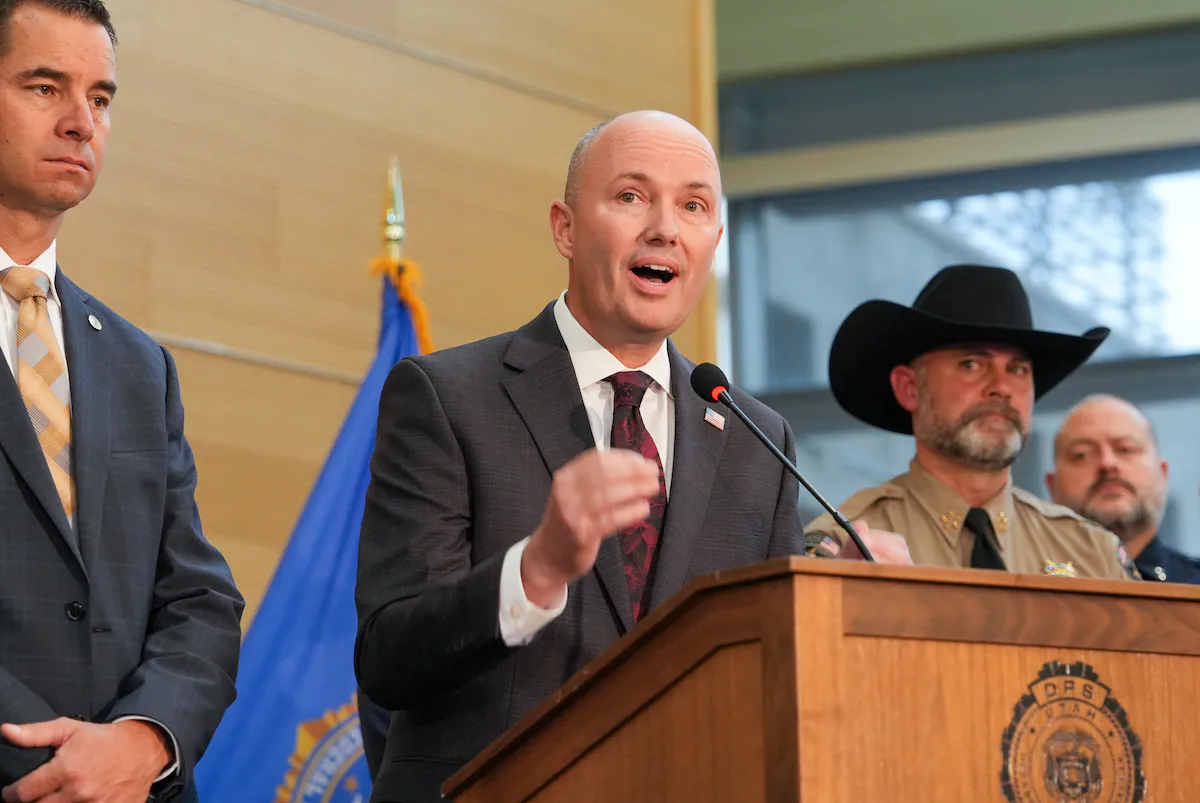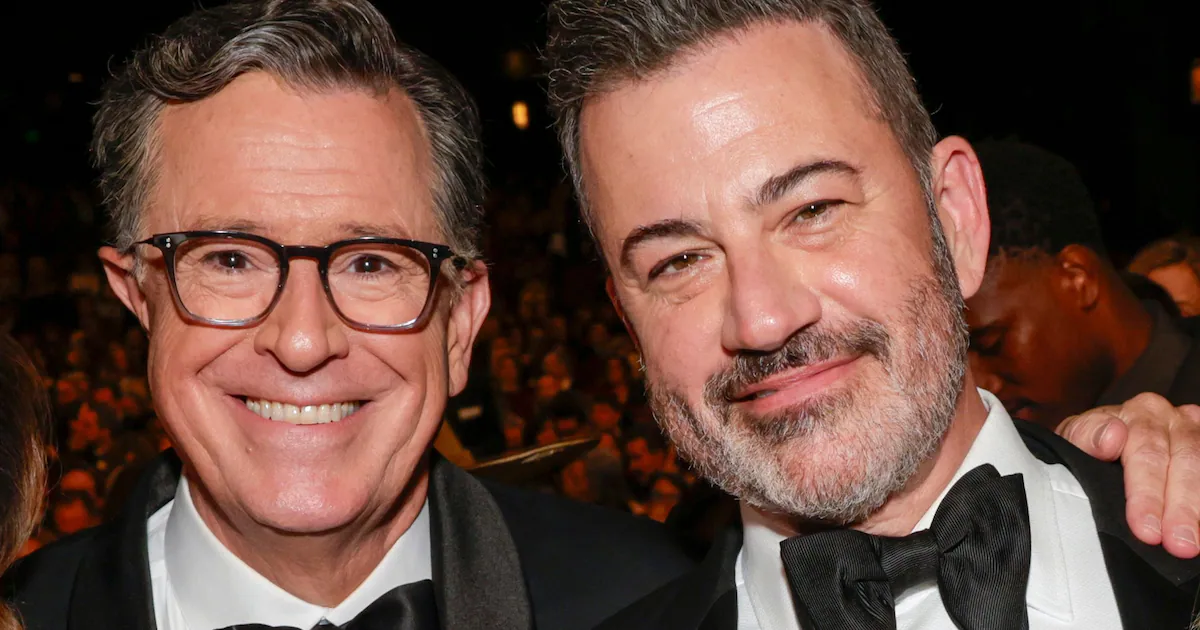
Spencer Cox first rose to the national scene in the wake of a shooting that shook the nation — a massacre at the Pulse Night Club, a gay bar in Orlando, Florida, that claimed 49 lives. At the time, in 2016, it was the worst mass shooting in the nation’s history.
Then Utah’s lieutenant governor, Cox won praise from pundits and politicos for his raw, compassionate words, confessing his regret over his mistreatment of gay classmates as a young high school student.
“I am speaking now to the straight community,” Cox said at the time. “How did you feel when you heard that 49 people had been gunned down by a self-proclaimed terrorist? That’s the easy question. Here is the hard one: Did that feeling change when you found out the shooting was at a gay bar at 2 a.m. in the morning? If that feeling changed, then we are doing something wrong.”
Now, nine years later, the second-term governor has found himself again on the national stage in the aftermath of more gun violence — a shooting that left prominent conservative activist and provocateur Charlie Kirk dead, cut down during an appearance at Orem’s Utah Valley University.
And Cox has used the platform to sound an alarm about corrosive political discourse and the dangerous path the nation is traveling.
“Every one of us has to make a decision. Are we going to hate our neighbor? Are we going to hate the other side? Are we going to return violence with violence?” Cox asked during an appearance on ABC News’ “This Week,” “or are we going to find a different path?”
He blamed social media companies and “conflict entrepreneurs” whose algorithms, he said, addict users and fuel more outrage.
“Can we put that aside?” he asked. “Can we go and serve our fellow human beings? Can we do some good in our neighborhood? Can we hug a family member? Can we talk to a neighbor that we disagree with? That’s up to us. And that’s the only way out of this. There’s nothing else we can do to solve this dark chapter in our history.”
Cox’s office did not make the governor available for an interview for this story.
‘I know this guy is a Republican’
For Utahns familiar with Cox’s “Disagree Better” mantra, or even his “you hate that I don’t hate enough” speech to the Utah GOP, the rhetoric isn’t new. But for the national audience, unaware of Cox’s approach, it was a distinctly different tone than that coming from his fellow Republicans in the White House and President Donald Trump.
White House Deputy Chief of Staff Stephen Miller pointed the blame at the administration’s political opponents on the left, calling it a “vast domestic terror movement.”
“With God as my witness, we are going to use every resource we have at the Department of Justice, Homeland Security and throughout this government to identify, disrupt, dismantle and destroy these networks and make America safe again for the American people,” he added. “It will happen, and we will do it in Charlie’s name.”
Hours after Kirk’s death, Trump blamed the murder on “radical-left political violence” and vowed to find “each and every one of those who contributed to this atrocity.”
U.S. Attorney General Pam Bondi initially said the Justice Department would crack down on “hate speech” but later backtracked and said it would focus its efforts on hate speech that includes threats of violence.
The governor’s dual role — conveying information about the investigation and calling for civility in society — has been laudable, according to University of Utah political science professor Matthew Burbank.
But Cox, Burbank said, is also “completely ignoring the fact that people like the president are quite simply trying to take advantage of this and use this for their own political purposes.”
“If you’re going to make the argument that everyone on both sides needs to change the way they do things,” he added, “you need to be careful to make sure part of this is critiquing your own side.”
Cox has, in interviews and news conferences, acknowledged the violence targeting officeholders of both parties, noting that “the bodies are piling up.” But on NBC’s “Meet The Press,” he also pointed to the “leftist ideology” as a motive for the alleged shooter.
A study released this week by the Cato Institute, a libertarian think tank, found that, excluding the 9/11 terror attacks that killed thousands, attacks inspired by right-leaning ideology accounted for 63% of American deaths from political violence over the past 50 years, compared to 10% attributed to left-leaning attacks. (A large share of the deaths attributed to right-leaning violence occurred in the 1995 Oklahoma City bombing.)
For the most part, Cox has drawn accolades for his message, including from prominent national Democrats.
This week, former President Barack Obama praised Cox for his “response to this tragedy, as well as his history of how he engages with people who are political adversaries.”
“He has shown, I think, that it is possible for us to disagree,” Obama said, “while abiding by a basic code of how we should engage in public debate.”
David Axelrod, who was Obama’s chief strategist in the 2008 and 2012 campaigns, posted on the social media platform X that he had “such respect for @GovCox for the heartfelt, thoughtful plea he just delivered to our frayed American community.”
“We can continue to barrel down this path of increasing violence, or choose a better path and resist the siren song of hate and division,” Axelrod wrote.
“I know this guy is a Republican and all but I swear you could win all the electoral votes with this message in ‘28,” wrote Sen. Brian Schatz, D-Hawaii, in another post.
And The Wall Street Journal’s editorial page called Cox’s words “a lesson in moral and political leadership.”
‘What is going on out there’
Cox’s harshest critics, as they’ve been during his past two gubernatorial elections, have seemingly been on his political right.
Trump ally Steve Bannon — who said after Kirk’s death that “we are at war” — called Cox “part of the problem” that led to Kirk’s shooting. Bannon, a White House strategist during Trump’s first term, said there should be an investigation into why Cox was even in front of a microphone. Once FBI Director Kash Patel arrived in the state, Bannon said, “Why was [Cox] allowed to have a speaking role? Who made that decision?”
Bannon also took aim at The Church of Jesus Christ of Latter-day Saints, of which Cox is a member, saying, “There’s something wrong, and I think the Mormon church has to address it.”
“The shooter’s Mormon, comes from a Mormon family. What is going on out there? And why is the Mormon church not stepping up here in a bigger way?” Bannon said during his podcast this week.
Utah’s predominant faith issued two news releases after the Kirk shooting condemning violence and calling for greater kindness and love.
Asked by CNN about Bannon’s criticism, Cox dismissed him as a “conflict entrepreneur,” among those “who benefit from radicalizing us. And I’m not one of those. I don’t know that that’s particularly helpful.”
Kirk had also criticized the Utah Republican.
In 2022, after Cox’s veto of a bill banning transgender kids from high school sports, Kirk posted on social media that the Utah governor “should be expelled from the Republican Party.” Kirk accused Cox of being bought off by drug companies that profit from “hormone blockers and chemical castration.”
Last year, in a clip recently reposted by former state Rep. Phil Lyman, who lost the GOP nomination for governor to Cox, Kirk asked the audience, “Can you believe your governor?”
“What is wrong with this guy?” asked Kirk, who was appearing at a campaign event for Trent Staggs’ losing U.S. Senate bid. “… If I have to hear him talk about pronouns one more time. You, the people of Utah, deserve a much better leader.”
Civility has been a key part of Cox’s public persona for years. In 2020, he recorded a TV ad with his Democratic opponent for governor promoting positivity and unity. During the COVID-19 pandemic, he brought cookies to protesters rallying outside his home.
And, in 2023, he launched his “Disagree Better” initiative and has worked to promote civil political discourse with Democratic governors like Jared Polis of Colorado and Wes Moore of Maryland.
“His initiative of ‘Disagree Better’ was grounded in: ‘Let’s have these debates, let’s have these arguments. We can do it without hating the other side,” said Tami Pyfer, co-creator of The Dignity Index, which scores political speech on whether it is demeaning or uplifting.
“That’s still what he’s leaning back into,” she said. “How do we have these conversations in a way without hating the other people?”
Pyfer was giving a lecture at the University of Virginia about civil discourse last week, and at the end, when students turned their phones back on, saw that Kirk had been killed. “One of the students said, ‘This is exactly what you were talking about,’” she said.
“[The governor] is asking people to set aside the labels and the demonizing of the other side. … If you’re not seen as human, violence is seen as appropriate. It’s patriotic,” she said. “Right now, I think more people than ever want to hear this. If you look at a lot of the data … 75% of the population who are not on either extreme, they are starving for this.”
‘80% of the way down the road’
It has not always been easy for Cox to live up to his own rhetoric.
Two years ago, he apologized after calling members of Congress “imbeciles” over their handling of immigration. More recently, addressing a bill banning rainbow LGBTQ+ flags from public buildings, Cox said it was a “dumb bill” and criticized “dumb flags” Salt Lake City adopted to get around the law. “We are living in the dumbest timeline right now,” he said.
Still, the governor’s focus on a more genteel style of politics has at times made for an uncomfortable fit in a Trump-dominated Republican Party.
Cox did not vote for or support Trump in 2016 or 2020 — calling Trump “dangerous” and saying he “represents the worst of what our great country stands for.” It wasn’t until 2024, following more gun violence — an assassination attempt on then-candidate Trump — and during Cox’s own bid for reelection, that Cox endorsed Trump for president.
In a lengthy letter to Trump at the time, Cox expressed his support based on the belief that God had spared Trump’s life and his belief that Trump could unite the country and help to bridge the political divides that exist.
Utah Democratic Party Chair Brian King, who ran against Cox for governor last year, said Cox has developed a pattern of behavior in which he alternates between following his own principles and, after he is criticized by the GOP’s MAGA base, “veering” to try to appease them.
“[He’s] someone who, I think, is really struggling to reconcile his conscience with the political realities of today’s Republican Party. And I think it’s an irreconcilable conflict,” King said. Cox’s attempt to mollify the base, King added, “lacks all credibility and you end up satisfying no one. I think that’s where Governor Cox is right now. He’s in no-man’s land.”
Reed Galen, a political strategist and co-founder of the never-Trump group The Lincoln Project, points to Cox’s maneuvering on transgender issues as an example of the governor’s squishiness.
In his 2022 veto of the ban on transgender kids in school sports, Cox wrote a lengthy letter that, Galen said, was “as thoughtful an explanation as I’d seen from just about anybody,” regardless of political party.
But the Legislature overrode the veto, Cox took considerable political heat, and he has since signed legislation outlawing gender-affirming care for minors, limiting which restrooms transgender individuals can use and restricting access to college dorms for transgender students.
“He gets about 80% of the way down the road doing the right thing,” Galen said, “and then, at the last minute, decides, ‘Oh, am I being too decent?’ and feels like he has to get right with a wing of the party he’ll never be able to get right with.”
Whether Cox’s message of unity for the past week resonates with his party or the other remains to be seen. He has acknowledged in interviews that no governor and no president can change the national dialogue alone, but it has to change.
“We can return violence with violence. We can return hate with hate,” Cox said. “At some point, we have to find an off-ramp, or it’s going to get much, much worse. But see, these are choices that we can make. History will dictate if this is a turning point for our country. But every single one of us gets to choose right now if this is a turning point for us. We get to make decisions. We have our agency.”



